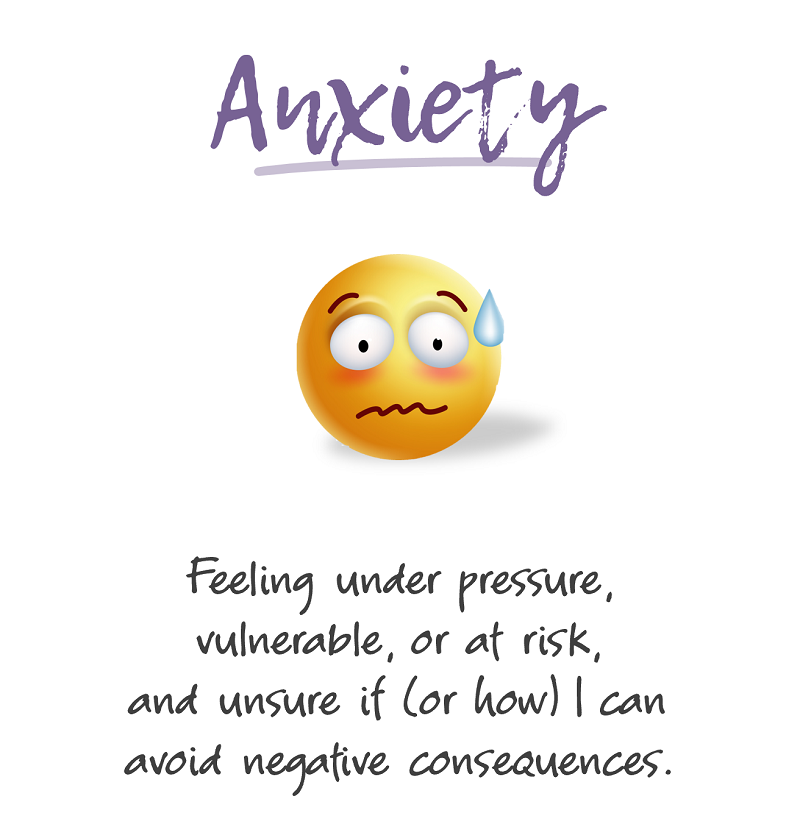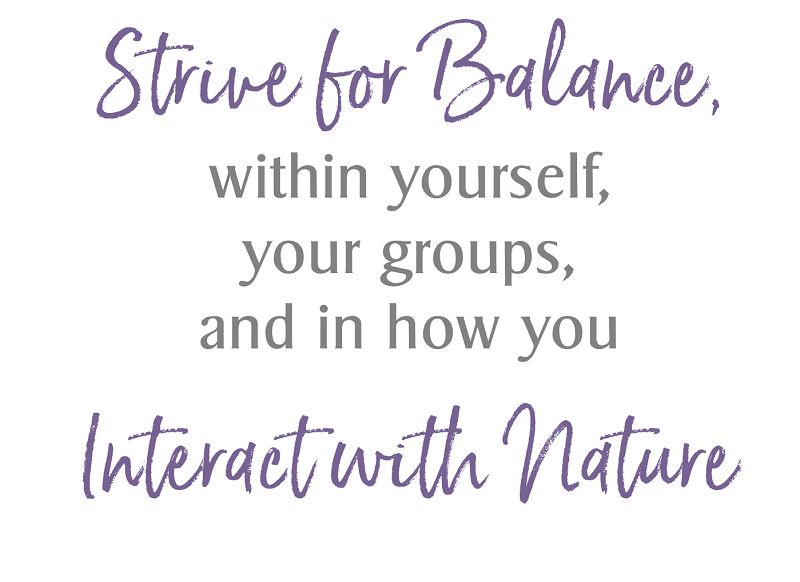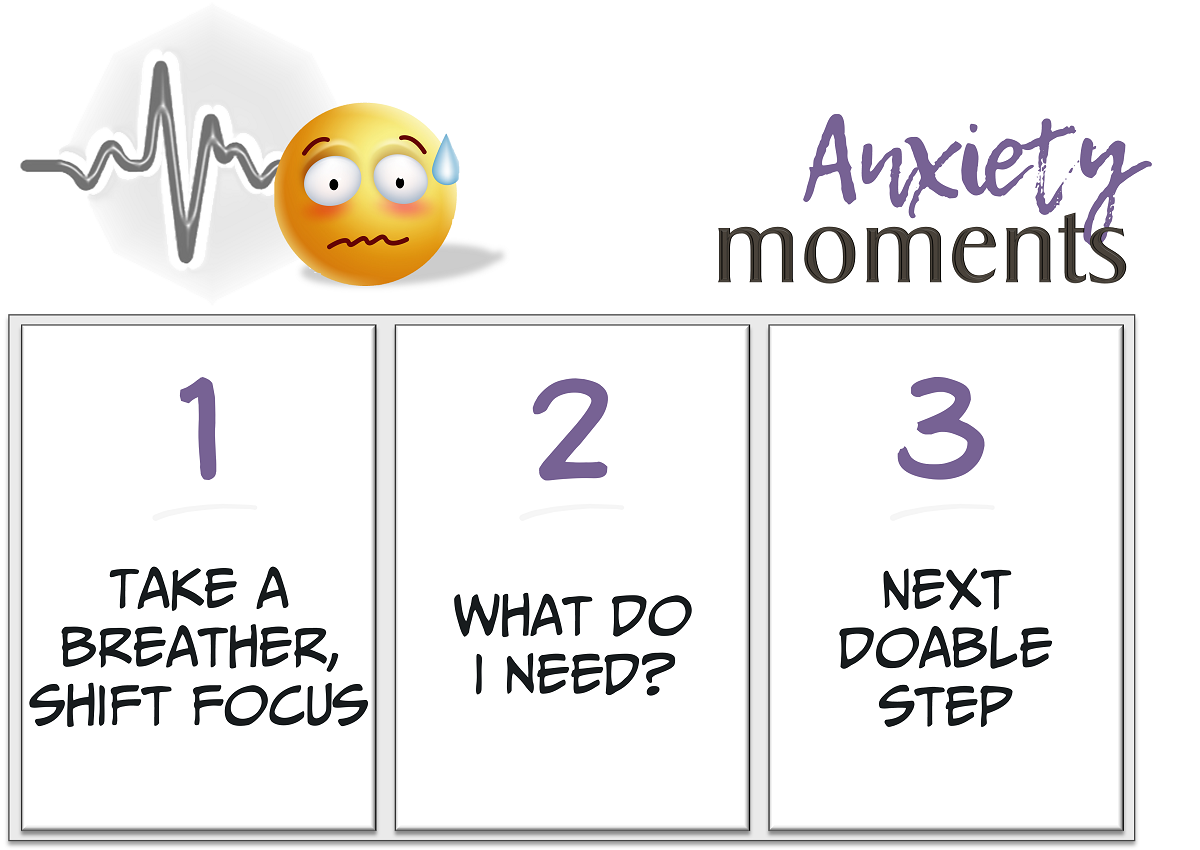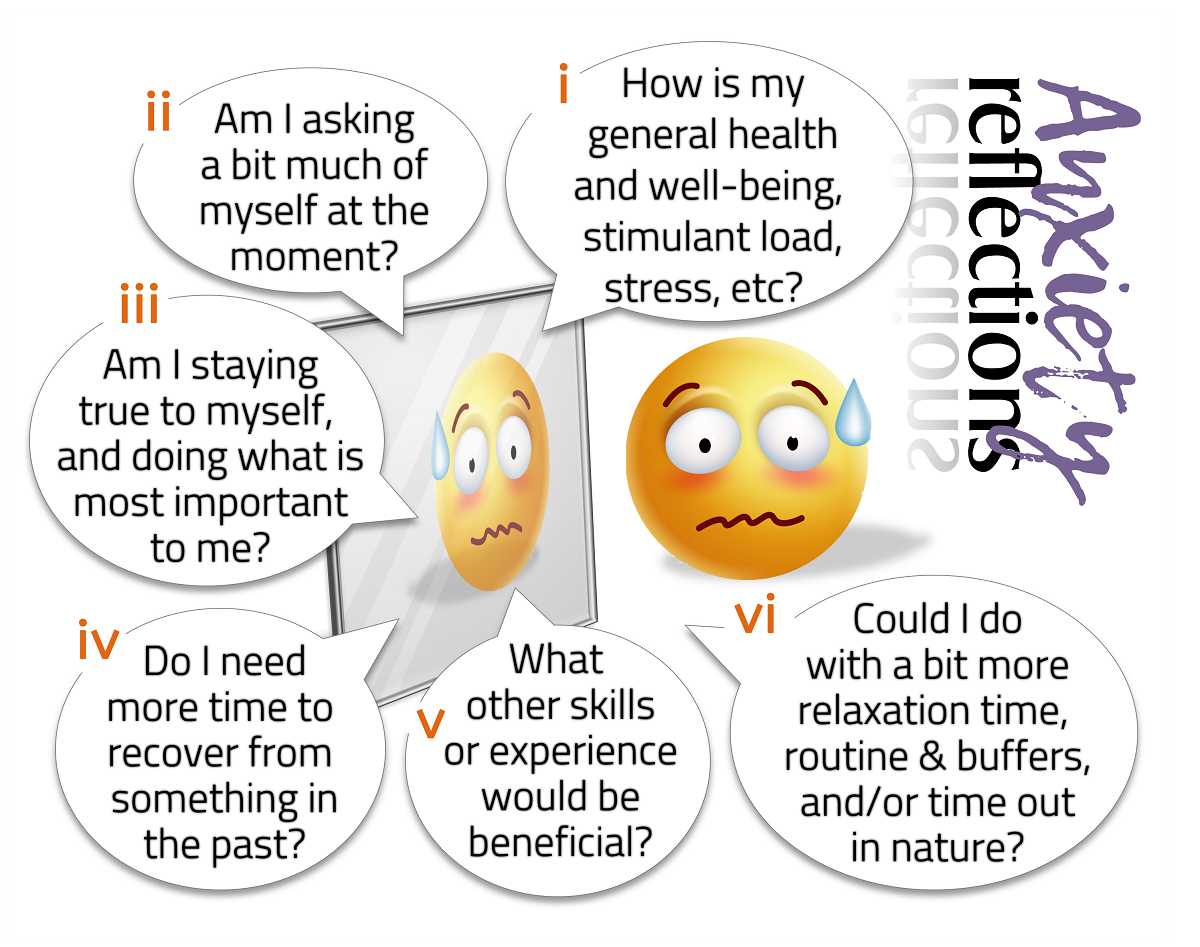What Is It About?
Handling Anxiety
In The Moment
Training our brain to use a relevant process helps us to focus more effectively and move on more easily. Using it often will also help our brain to catch Anxiety sooner, making it easier to manage.
-
If we start to feel anxious in a situation, taking a break and a few deep breaths to ‘reset’ things, can help to settle our nervous system.
The ‘box breathing’ technique may be quite useful here – using counts of 4 to make our way around a cycle of inhale, hold, exhale, and hold, 4 times. For more info see the box breathing page.
Other techniques can be used to help to calm our nerves further, such as:
Shifting our focus onto something else that is distracting, or better still, is relaxing for us.
Looking out into a safe space, far and wide, to offset the feeling of tunnel vision that often occurs.
Reminding ourselves that it’s a physiological reaction to something our body wasn’t sure about, and the hormones may take a while to settle
Imagining flooding our body with the feeling of calmness.
-
Once we are comfortable to let our nerves do their thing, it’s worth taking a moment to pinpoint what we are really needing – for ourselves. As we are the only ones who really know what’s right for us.
-
Acknowledging we have a choice in how we respond, and focusing upon what we can do with what we have control of (and responsibility for), can make it easier for us to identify the next step.
If the next step is not obvious straight up, getting creative with our ideas, and looking at options that are doable now but provide room for improvement later, can make all the difference.
Giving ourselves a buffer such as postponing things for a little while, might also be all we need to give ourselves thinking space to find a more suitable long-term solution.
CALMING ANXIETY VIDEO
The 3 minute video below gently goes through a combination of the techniques mentioned in this section, using a calming voice and simple animated drawings, to the relaxing background sound of waves on a beach.
N.B. It may help to run through the video a few times.
Self-Reflection
If the emotion feels quite troubling, it’s usually worth checking if something else is going on first.
By resolving things in ourselves and clearing any other residual emotions, we can reduce the intensity of the emotion - now and when we encounter it again in future.
Doing so also makes us less likely to ‘attract’ other difficulties that leave us feeling the same way.
See the Processing and Clearing an Emotion page for a generic process to resolve and clear an emotion.
Working Through Anxiety
The actions we choose to take in response to an emotion can make a significant difference to how well we adjust and move on from it.
The more we take genuine actions that are uplifting and ‘right’ i.e., are good for ourselves and everyone else (including the environment and other living beings) - for now, and over the long-term, the better our experience of life becomes.
Once our nervous system has settled a bit we can take a closer look at the situation to decide the best approach, which may involve one or more of:
If our nervous system has been overloaded, taking more time to allow ourselves to recover, and using a more managed approach (see the next section).
Giving ourselves what we need to be in a better position to deal with the situation, and to move in a positive direction.
Doing the right amount of preparation and practice – not too little and not too much, to put ourselves on the front foot. Appreciating that learning is a process that takes time, and often a lot of trial and error.
Using our problem-solving skills and intuition to come up with a doable plan (that also fits well with who we are), and if required, adding a bit of courage, self-talk, and focused action to make it happen.
Backing ourselves to go for it, doing our best, and having faith that it will all work out one way or another.
Taking focused action that matches the plan, whilst remaining flexible to adapt to the situation.
Appreciating how far we have come already, and what else is working well in our life.
Frequently reviewing our progress, learning from our experience as we go, and adapting our approach to get a better result.
If the situation requires it, taking a more structured approach to help pinpoint what changes will be beneficial, including:
-
Checking our baseline level of stress, including relevant past experiences, what else is going on, and how well the situation fits us.
Getting a good understanding of the situation such as doing more research, checking assumptions, putting key info onto a single page to make it easier to consider everything at the same time, then standing back to look at the bigger picture.
Looking at what skills and resources we have available to us, what training or advice would be helpful, whether we have enough to give it a good go, or whether we could benefit from some additional help.
Checking our intuition for insights on the best direction to take, or what to explore further.
Having a clear vision of the outcome we would like, and visualising that as having happened already. If relevant, setting a goal, and breaking it down into manageable chunks and sub-goals to help build positive momentum as we move forward.
Using different problem-solving techniques to manage the risks and overcome any hurdles.
Recovery
If our nervous system feels a bit hammered or fragile, taking a phased approach can help us to recover and gradually make our way back to more challenge again:
-
Taking things a bit easier for a while e.g.,
giving our body what it needs
establishing a doable routine
using bigger buffers where we can e.g., time, money, food in the pantry, petrol in the tank, etc.
adding more enjoyment into everyday tasks
doing things that re-vitalise us e.g., time in nature
-
Getting back into a more normal routine, and keeping things easily manageable e.g.,
actively choosing situations that are good for us and help us thrive.
taking stock of our skills, experience, and gifts.
prioritising outcomes we want.
staying true to our values, character, and word.
getting our brain into the habit of spotting the positives in situations.
appreciating the good stuff in our life, every day.
-
Exploring new things, broadening our experience, and building upon our skills and capabilities e.g.,
giving ourselves the time, resources, skills, knowledge, tools, preparation, practice, and whatever else we need, to be on the front foot of the important stuff in our life.
staying connected with our network of support.
-
When ready to, working towards something important to us, or pursuing new opportunities e.g.,
balancing our time between what is within range of our capability, and new things that expand that range.
taking a gradual approach and starting from where we are, and what is doable for us, then building from there.
setting goals, and structuring things to give ourselves a ‘succession of successes’ to add enjoyment, and build up positive momentum.
allowing plenty of recovery time for our nervous system after each period of extending ourselves (or stress).
Clearing Residual Anxiety
Emotional energy can stick with us, even after we have worked through and resolved whatever caused it.
There are a number of ways we can clear the energy, including doing something physical in nature, imagining the emotion leaving our body, or for more intense emotions, there is a variety of different therapies and alternative forms of energy healing that can also help.
-
The short video below has been created to help imagine emotional energy leave the body, using the following visualisation process:
Imagine holding a ball of energy in your hands, and ‘charging’ it with the feeling of love, and anything else that would help to offset it (especially any feelings that were missing in the situation)
Imagine any residual Anger energy flowing out of your body, into the ball, and being transformed into the positive equivalent.
Once all the residual energy has left, imagine the ball shooting far out into the atmosphere and dissolving into pure white light energy.






